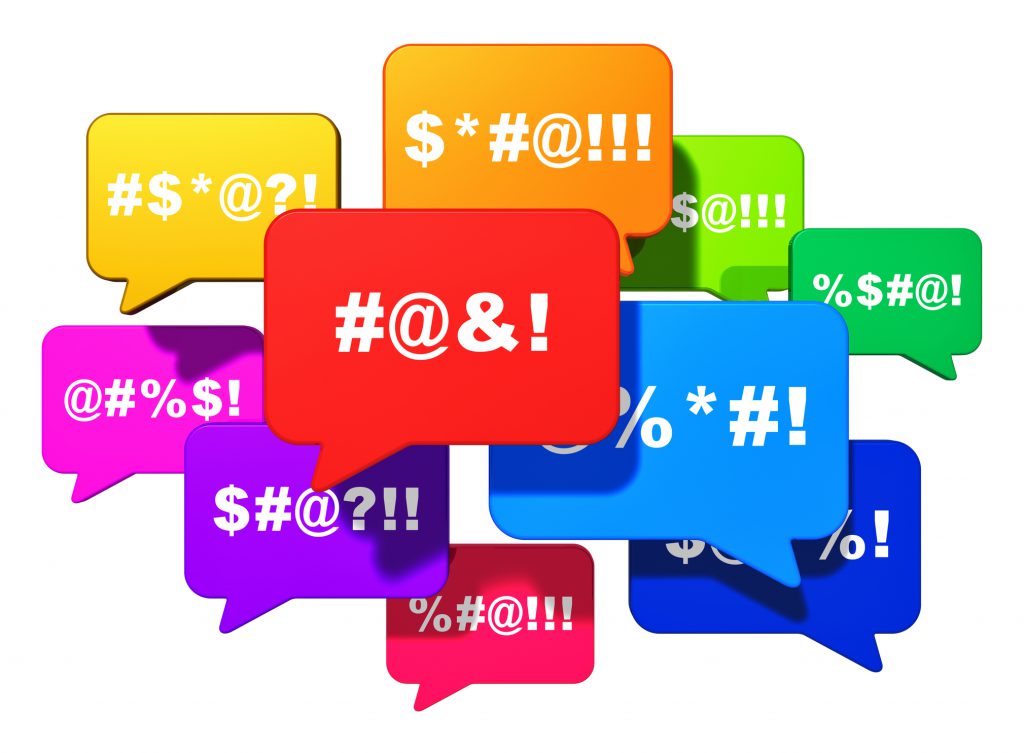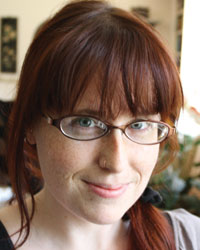Funny Sounds Affectys to Go Over Swearing
Member Article
The Science of Swearing
April 25, 2012

Why would a psychological scientist study swearing? Expertise in such an area has different practical significance inside and outside the community of psychological science. Outside the scientific community, expertise on taboo language is justification for frequent consultation about contemporary issues that are perennial: Is swearing harmful? Should children be allowed to swear? Is our swearing getting worse? One of us has been interviewed over 3,000 times by various media with respect to the questions above, as well as those about the use of taboo words in television, advertising, professional sports, radio, music, and film. In addition to consultation with mass media, expert testimony has been needed in cases involving sexual harassment, fighting words, picket-line speech, disturbing the peace, and contempt of court cases.
Considering the persistent need for an expert to consult for the above issues, it is odd that swearing expertise is weighted so differently when swearing is viewed from the perspective of psychological science. While hundreds of papers have been written about swearing since the early 1900s, they tend to originate from fields outside of psychology such as sociology, linguistics, and anthropology. When swearing is a part of psychological research, it is rarely an end in itself.

Kristin Janschewitz
It is far more common to see strong offensive words used as emotionally arousing stimuli — tools to study the effect of emotion on mental processes such as attention and memory.
Why the public-versus-science disconnect? Is swearing, as a behavior, outside the scope of what a psychological scientist ought to study? Because swearing is influenced so strongly by variables that can be quantified at the individual level, psychological scientists (more than linguists, anthropologists, and sociologists) have the best training to answer questions about it. Another explanation for the relative lack of emphasis on this topic is the orientation of psychological science to processes (e.g., memory) rather than life domains (e.g., leisure activities), a problem described by Paul Rozin. Arguably, a more domain-centered approach to psychological study would better accommodate topics such as swearing and other taboo behaviors.
Regardless of the reason for the relative lack of emphasis on swearing research per se inside psychological science, there is still a strong demand from outside the scientific community for explanations of swearing and associated phenomena. To give the reader a sense of the work that we do as psychological scientists who study swearing, let's consider some of the common questions we're asked about swearing.
Is swearing problematic or harmful?
Courts presume harm from speech in cases involving discrimination or sexual harassment. The original justification for our obscenity laws was predicated on an unfounded assumption that speech can deprave or corrupt children, but there is little (if any) social-science data demonstrating that a word in and of itself causes harm. A closely related problem is the manner in which harm has been defined — harm is most commonly framed in terms of standards and sensibilities such as religious values or sexual mores. Rarely are there attempts to quantify harm in terms of objectively measurable symptoms (e.g., sleep disorder, anxiety). Psychological scientists could certainly make a systematic effort to establish behavioral outcomes of swearing.
Swearing can occur with any emotion and yield positive or negative outcomes. Our work so far suggests that most uses of swear words are not problematic. We know this because we have recorded over 10,000 episodes of public swearing by children and adults, and rarely have we witnessed negative consequences. We have never seen public swearing lead to physical violence. Most public uses of taboo words are not in anger; they are innocuous or produce positive consequences (e.g., humor elicitation). No descriptive data are available about swearing in private settings, however, so more work needs to be done in that area.
Therefore, instead of thinking of swearing as uniformly harmful or morally wrong, more meaningful information about swearing can be obtained by asking what communication goals swearing achieves. Swear words can achieve a number of outcomes, as when used positively for joking or storytelling, stress management, fitting in with the crowd, or as a substitute for physical aggression. Recent work by Stephens et al. even shows that swearing is associated with enhanced pain tolerance. This finding suggests swearing has a cathartic effect, which many of us may have personally experienced in frustration or in response to pain. Despite this empirical evidence, the positive consequences of swearing are commonly disregarded in the media. Here is an opportunity for psychological scientists to help inform the media and policymakers by clearly describing the range of outcomes of swearing, including the benefits.
Is it bad for children to hear or say swear words?
The harm question for adult swearing applies to issues such as verbal abuse, sexual harassment, and discrimination. When children enter the picture, offensive language becomes a problem for parents and a basis for censorship in media and educational settings. Considering the ubiquity of this problem, it is interesting that psychology textbooks do not address the emergence of this behavior in the context of development or language learning.
Parents often wonder if this behavior is normal and how they should respond to it. Our data show that swearing emerges by age two and becomes adult-like by ages 11 or 12. By the time children enter school, they have a working vocabulary of 30-40 offensive words. We have yet to determine what children know about the meanings of the words they use. We do know that younger children are likely to use milder offensive words than older children and adults, whose lexica may include more strongly offensive terms and words with more nuanced social and cultural meanings. We are currently collecting data to better understand the development of the child's swearing lexicon.
We do not know exactly how children learn swear words, although this learning is an inevitable part of language learning, and it begins early in life. Whether or not children (and adults) swear, we know that they do acquire a contextually-bound swearing etiquette — the appropriate 'who, what, where, and when' of swearing. This etiquette determines the difference between amusing and insulting and needs to be studied further. Through interview data, we know that young adults report to have learned these words from parents, peers, and siblings, not from mass media.
Considering that the consequences of children's exposure to swear words are frequently cited as the basis for censorship, psychological scientists should make an effort to describe the normal course of the development of a child's swearing lexicon and etiquette. Is it important to attempt to censor children from language they already know? While psychological scientists themselves do not establish language standards, they can provide scientific data about what is normal to inform this debate.
Has swearing become more frequent in recent years?
This is a very common question, and it's a tough one to answer because we have no comprehensive, reliable baseline frequency data prior to the 1970s for comparison purposes. It is true that we are exposed to more forms of swearing since the inception of satellite radio, cable television, and the Internet, but that does not mean the average person is swearing more frequently. In our recent frequency count, a greater proportion of our data comes from women (the reduction of a once large gender difference). We interpret this finding as reflecting a greater proportion of women in public (e.g., many more women on college campuses) rather than a coarsening of women. Our forthcoming research also indicates that the most frequently recorded taboo words have remained fairly stable over the past 30 years. The Anglo-Saxon words we say are hundreds of years old, and most of the historically offensive sexual references are still at the top of the offensiveness list; they have not been dislodged by modern slang. Frequency data must be periodically collected to answer questions about trends in swearing over time.
Thus, our data do not indicate that our culture is getting "worse" with respect to swearing. When this question arises, we also frequently fail to acknowledge the impact of recently-enacted laws that penalize offensive language, such as sexual harassment and discrimination laws. Workplace surveillance of telephone and email conversations also curbs our use of taboo language.
Do all people swear?
We can answer this question by saying that all competent English speakers learn how to swear in English. Swearing generally draws from a pool of 10 expressions and occurs at a rate of about 0.5 percent of one's daily word output. However, it is not informative to think of how an average person swears: Contextual, personality, and even physiological variables are critical for predicting how swearing will occur. While swearing crosses socioeconomic statuses and age ranges and persists across the lifespan, it is more common among adolescents and more frequent among men. Inappropriate swearing can be observed in frontal lobe damage, Tourette's disorder, and aphasia.
Swearing is positively correlated with extraversion and is a defining feature of a Type A personality. It is negatively correlated with conscientiousness, agreeableness, sexual anxiety, and religiosity. These relationships are complicated by the range of meanings within the diverse group of taboo words. Some religious people might eschew profanities (religious terms), but they may have fewer reservations about offensive sexual terms that the sexually anxious would avoid. We have yet to systematically study swearing with respect to variables such as impulsivity or psychiatric conditions, (e.g., schizophrenia and bipolar disorder). These may be fruitful avenues along which to investigate the neural basis of emotion and self-control.
Taboo words occupy a unique place in language because once learned, their use is heavily context driven. While we have descriptive data about frequency and self reports about offensiveness and other linguistic variables, these data tend to come from samples that overrepresent young, White, middle-class Americans. A much wider and more diverse sample is needed to better characterize the use of taboo language to more accurately answer all of the questions here.
Source: https://www.psychologicalscience.org/observer/the-science-of-swearing
0 Response to "Funny Sounds Affectys to Go Over Swearing"
Post a Comment